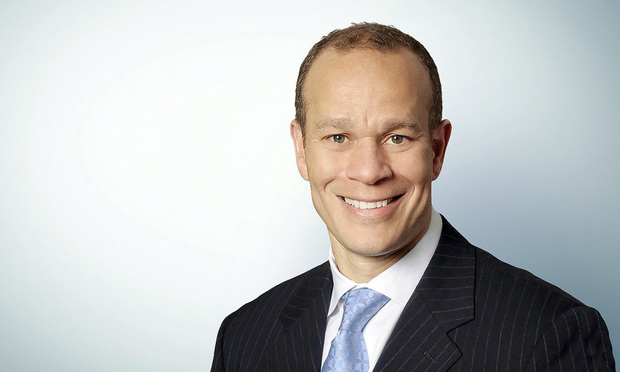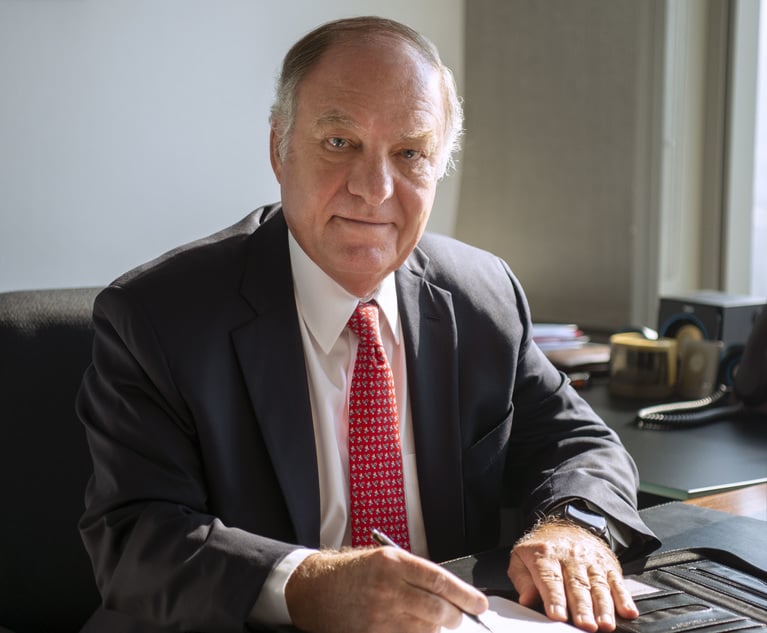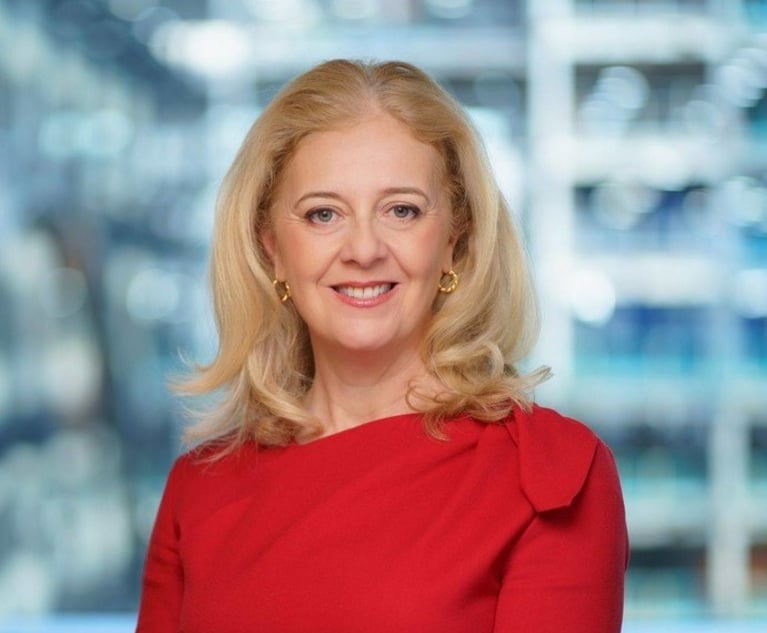Freshfields Taps NY Partner as First Client Sustainability Chief
Global M&A partner Tim Wilkins says the firm's clients want to be "on the right side of history."
June 05, 2019 at 12:01 AM
4 minute read
The original version of this story was published on The American Lawyer
 Timothy Wilkins, Freshfields Bruckhaus Deringer.
Timothy Wilkins, Freshfields Bruckhaus Deringer.
Freshfields Bruckhaus Deringer is creating a new role to address global clients' growing concerns about environmental issues and social responsibility.
New York-based partner Timothy Wilkins will serve as the U.K.-based firm's first global partner for client sustainability and will lead a team of lawyers across practice groups and spanning the firms' offices around the world.
"Both in the boardroom and the general counsel's office, there is a lot more focus on sustainability issues," Wilkins said.
This impulse is in part driven from the outside, as investors and shareholders as well as communities are putting pressure on businesses to pay increased attention to environmental, social and governance issues. But Wilkins believes that clients are themselves realising the need to participate in the broader sustainability agenda.
"They recognise that governments and the non-profit sector are not going to be able to marshal the full suite of resources necessary to handle ESG issues on their own," he said.
As an example, he noted that $90 trillion will be needed in infrastructure investment worldwide by 2030, and to ensure that that those investments meet sustainable development goals, 80% will have to come from the private sector.
"Clients are asking: 'What will qualify?" Wilkins said.
The cross-border M&A lawyer joined Freshfields in 1999 and became a partner in 2002. He spent his first seven years with the firm in its Tokyo office, before moving to New York. Sustainability questions have always been an area of interest, he said.
A member of the board of directors of the New York City Economic Development Corporation since 2015, Wilkins and the firm are already looking at the city's sustainability challenges on the Circular New York City Initiative. Representatives from the mayor's office, the economic development corporation, firm clients and thinktanks are devising plans for creating a circular economy that makes better use of the city's scarce resources while minimising waste.
In addition to guiding clients on investments in environmental sustainability, Freshfields also aims to work with them on issues like human rights considerations throughout their supply chains.
Not only do clients receive guidance on regulations in emerging economies that they need to be aware of from a risk mitigation perspective, it also allows them to get out on the forefront and demonstrate that they are succeeding in providing a sustainable business from a human rights point of view.
"I really think our clients have said they want to be on the right side of history here and are quite proactively working with us to come up with new products and new proposals to address these issues," Wilkins said.
Wilkins is also optimistic that the firm's focus on sustainability will provide a boon to recruiting new lawyers.
"Talent is so sophisticated now in terms of making their choices, in terms of which law firms to work at and looking at the type of work they do," he said. "The excitement of working with clients in terms of making a positive social impact really makes a lot of impact."
Some of the firms summer associates are already involved, he added, explaining that it's some of the most challenging work a young lawyer will encounter.
"The skills they need to bring to bear really need to go across practice groups," he said. "They're thinking like a litigator but acting on transactions like a corporate lawyer. So they're quite excited about that."
Read More
Corporate Social Responsibility and Sustainability and Why Law Firms Should Care
Prince Charles to General Counsel: Help Companies Combat Climate Change
Some See Career Conundrum in Law Firms' Energy Work
This content has been archived. It is available through our partners, LexisNexis® and Bloomberg Law.
To view this content, please continue to their sites.
Not a Lexis Subscriber?
Subscribe Now
Not a Bloomberg Law Subscriber?
Subscribe Now
NOT FOR REPRINT
© 2025 ALM Global, LLC, All Rights Reserved. Request academic re-use from www.copyright.com. All other uses, submit a request to [email protected]. For more information visit Asset & Logo Licensing.
You Might Like
View All
Carey Abogados’ Senior Partner Becomes New Head of IBA, First Chilean to Assume Role of President

Goodwin Hires Quinn Emanuel Antitrust Partner to Launch Brussels Office
3 minute read
Claus von Wobeser: Mexico's ‘Godfather of Arbitration’ Becomes Firm’s Honorary Chair

Jenner & Block Expands London Team with Baker McKenzie Hire to Lead New Practice Area
2 minute readTrending Stories
Who Got The Work
J. Brugh Lower of Gibbons has entered an appearance for industrial equipment supplier Devco Corporation in a pending trademark infringement lawsuit. The suit, accusing the defendant of selling knock-off Graco products, was filed Dec. 18 in New Jersey District Court by Rivkin Radler on behalf of Graco Inc. and Graco Minnesota. The case, assigned to U.S. District Judge Zahid N. Quraishi, is 3:24-cv-11294, Graco Inc. et al v. Devco Corporation.
Who Got The Work
Rebecca Maller-Stein and Kent A. Yalowitz of Arnold & Porter Kaye Scholer have entered their appearances for Hanaco Venture Capital and its executives, Lior Prosor and David Frankel, in a pending securities lawsuit. The action, filed on Dec. 24 in New York Southern District Court by Zell, Aron & Co. on behalf of Goldeneye Advisors, accuses the defendants of negligently and fraudulently managing the plaintiff's $1 million investment. The case, assigned to U.S. District Judge Vernon S. Broderick, is 1:24-cv-09918, Goldeneye Advisors, LLC v. Hanaco Venture Capital, Ltd. et al.
Who Got The Work
Attorneys from A&O Shearman has stepped in as defense counsel for Toronto-Dominion Bank and other defendants in a pending securities class action. The suit, filed Dec. 11 in New York Southern District Court by Bleichmar Fonti & Auld, accuses the defendants of concealing the bank's 'pervasive' deficiencies in regards to its compliance with the Bank Secrecy Act and the quality of its anti-money laundering controls. The case, assigned to U.S. District Judge Arun Subramanian, is 1:24-cv-09445, Gonzalez v. The Toronto-Dominion Bank et al.
Who Got The Work
Crown Castle International, a Pennsylvania company providing shared communications infrastructure, has turned to Luke D. Wolf of Gordon Rees Scully Mansukhani to fend off a pending breach-of-contract lawsuit. The court action, filed Nov. 25 in Michigan Eastern District Court by Hooper Hathaway PC on behalf of The Town Residences LLC, accuses Crown Castle of failing to transfer approximately $30,000 in utility payments from T-Mobile in breach of a roof-top lease and assignment agreement. The case, assigned to U.S. District Judge Susan K. Declercq, is 2:24-cv-13131, The Town Residences LLC v. T-Mobile US, Inc. et al.
Who Got The Work
Wilfred P. Coronato and Daniel M. Schwartz of McCarter & English have stepped in as defense counsel to Electrolux Home Products Inc. in a pending product liability lawsuit. The court action, filed Nov. 26 in New York Eastern District Court by Poulos Lopiccolo PC and Nagel Rice LLP on behalf of David Stern, alleges that the defendant's refrigerators’ drawers and shelving repeatedly break and fall apart within months after purchase. The case, assigned to U.S. District Judge Joan M. Azrack, is 2:24-cv-08204, Stern v. Electrolux Home Products, Inc.
Featured Firms
Law Offices of Gary Martin Hays & Associates, P.C.
(470) 294-1674
Law Offices of Mark E. Salomone
(857) 444-6468
Smith & Hassler
(713) 739-1250








